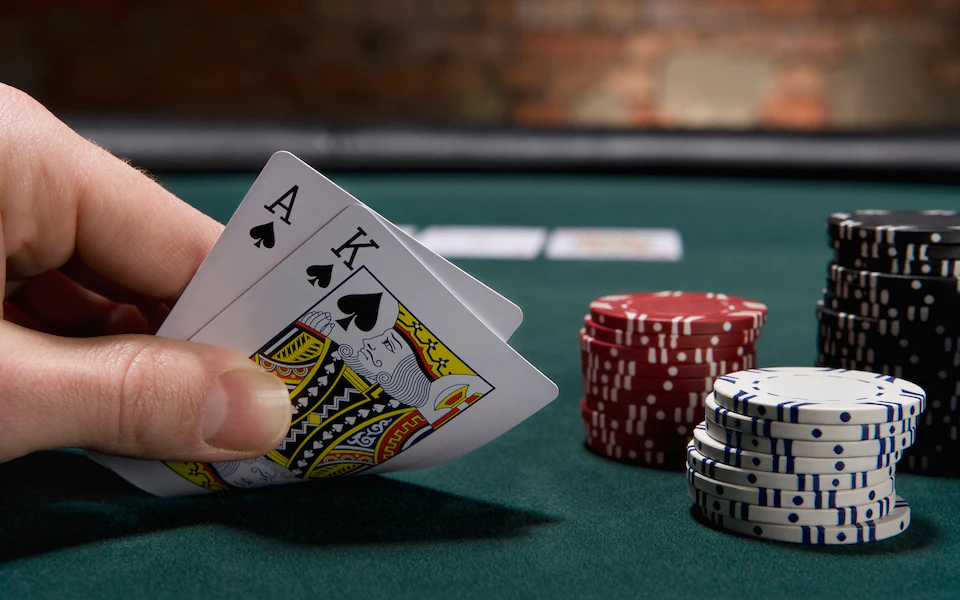Poker has been one of the most popular card games ever and has been around for centuries. It is a game of skill, strategy, and luck, and it can be played both online and in person. If you’re new to the game, it can be overwhelming to learn all the rules and strategies. However, with a little bit of guidance and practice, you’ll be playing like a pro in no time. Thus, below are some tips on how to play poker for beginners.
- Learn the basics: Before you start playing, make sure you understand the basic rules of the game. The standard poker hand ranking goes from high to low, with a royal flush being the highest and a high card being the lowest. The different types of hands include a straight flush, four-of-a-kind, full house, flush, straight, three-of-a-kind, two-pair, and one pair. In addition, it’s important to understand the betting structure, which typically involves an ante, blinds, and different rounds of betting.
- Start small: When you first start playing, it’s a good idea to start with small stakes. This will help you build your confidence and get a feel for the game before moving on to higher stakes. Starting small also allows you to learn the game without risking too much money.
- Understand the importance of position: In poker, your position at the table is crucial. The later you act in a hand, the more information you have about what the other players are doing. Being in a later position gives you the advantage of being able to see what the other players do before making your own decisions.
- Pay attention to the other players: One of the most important things you can do when playing poker is to pay attention to the other players. Look for patterns in their betting, and try to understand their playing style. Are they tight or loose players? Do they like to bluff or play conservatively? Knowing this information can give you a huge advantage in the game.
- Be selective with your hands: One of the biggest mistakes beginners make is playing too many hands. It’s important to be selective with the hand you play and only play the best hands. This will help you avoid costly mistakes and increase your chances of winning. A good rule of thumb is to only play hands that are a pair or higher.
- Learn to bluff: Bluffing is an important part of poker, and it can be a great way to win a hand when you don’t have the best cards. However, it’s important to learn when to bluff and when not to. Bluffing too often can give the other players a clue about your strategy and make it easier for them to read your hand.
- Be aware of the pot odds: Pot odds are the ratio of the current pot size to the cost of a contemplated call. To make rational decisions, you must understand the pot odds and how they affect your expected value. For example, if the pot is $10 and it costs $2 to call, your pot odds are 5-1, which means you should call if your hand has at least a 20% chance of winning.
- Manage your bankroll: One of the most important things to remember when playing poker is to manage your bankroll. Don’t chase your losses and just stick to your budget. It’s also important to set limits on how much you’re willing to lose in one session. This will help you avoid going broke and keep the game fun.
- Practice: The best way to improve your poker skills is to practice. Play with friends, or play online on sites like adda52.com. The more you play, the more experience you’ll gain and the better you’ll become. Additionally, practicing different strategies and scenarios can help you become more adaptable to different situations that may arise during a game.
- Have fun: Remember, poker is a game, and it should be fun. Don’t take it too seriously, and don’t let it consume you. Even the best players lose sometimes, so don’t get discouraged if you don’t win every hand. Keep a positive attitude and enjoy the game.
- Study the game: In addition to practicing, it’s important to study the game. Read books, watch videos, and learn from more experienced players. This will help you develop a deeper understanding of the strategies and techniques used by top players, and give you an edge in your own game.
- Understand the importance of table image: Your table image is the perception that other players have of you based on your actions at the table. It’s important to be aware of your table image, as it can affect how other players play against you. If you have a tight table image, for example, other players may be less likely to bluff against you.
- Be aware of the psychological aspects of the game: Poker is not just about the cards and the strategies, it’s also about the psychology of the game. It’s important to be aware of the emotional state of your opponents and to use psychological tactics such as bluffing, slow-playing, and reading tells to gain an advantage.
- Stay focused: Poker is a game that requires a high level of concentration. It’s important to stay focused throughout the game and to avoid getting distracted by things like your phone or other players.
- Learn from your mistakes: Every player makes mistakes, and it’s important to learn from them. Analyze your play, and try to understand what went wrong and how you can improve in the future.
- Be adaptable: Poker is a game that is constantly changing, and it’s important to be adaptable to new situations. Be prepared to change your strategies and adapt to new opponents and situations.
- Play within your limits: Poker is a real cash game. It’s important to play within your limits, both financially and emotionally. Never play for more than you can afford to lose, and never let the game consume you emotionally.
In conclusion, playing poker can be a fun and exciting experience, but it’s important to have a good understanding of the basics and the strategies of the game. As a beginner, it’s important to start small, understand the importance of position, pay attention to other players, be selective with your hands, learn to bluff, understand pot odds, manage your bankroll, practice, and have fun. With patience, practice, and persistence, you can improve your skills and increase your chances of winning.





Be First to Comment